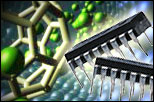Nanotech talks to help very small business in SA

Materials Australia and the Department of Innovation, Industry, Science and Research will be hosting a series of seminars next week encouraging small businesses across South Australia to get involved with nanotechnology.
The seminars will begin next Monday in regional centres across South Australia, earmarked as innovation hotspots, with Whyalla the first stop in the joint initiative between Materials Australia and the Federal department.

According to a statement issued by Materials Australia, the series of free workshops will focus primarily on how nanotechnology can be utilised in "improving everyday processes" for small business, presented by scientists.
Chair of nanotechnology for Materials Australia, Janis Matisons, told ZDNet.com.au "there are many ways [tech SMBs] can make use of it [nanotechnology]".
"There are some significant developments in photonics being made in Australia at the moment which I will be discussing along with other applications of nanotechnology," he said.
Matisons said that photonics — the science of generating and controlling photons — is having a significant development on emerging nanotechnology research relevant to ICT, particularly in the areas of storage and data transfer.
"Professor Tanya Monro at Adelaide University is working on photonic applications in data transfer right now ... so people are now talking about the possibility of moving terabytes of data at a time, and being able to do things like send whole teleconferences down a line," he said.
The Materials Australia researcher said that Monro is employing nanotechnology to cope with the demand for an increasing volume of storage to fit into ever smaller devices, saying that scientists are now able to use single molecule magnets to read, write and store data.
"As you get smaller though, the amount of heat generated by these devices and the tiny transistors in them becomes higher, so we're using nanotechnology to abate that as well," he said.
The seminars run through next week, and after Whyalla, will travel to Roxby Downs on 6 May, Renmark on 8 May, and Tanunda on 9 May.